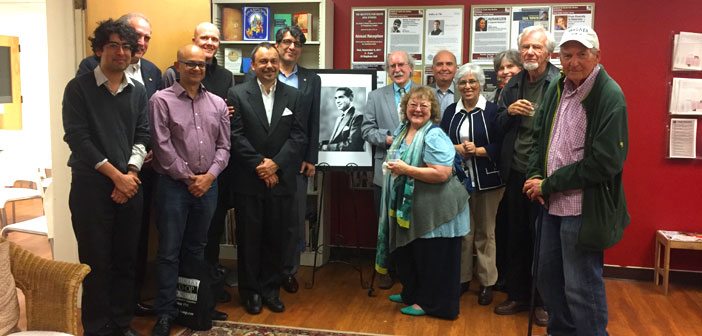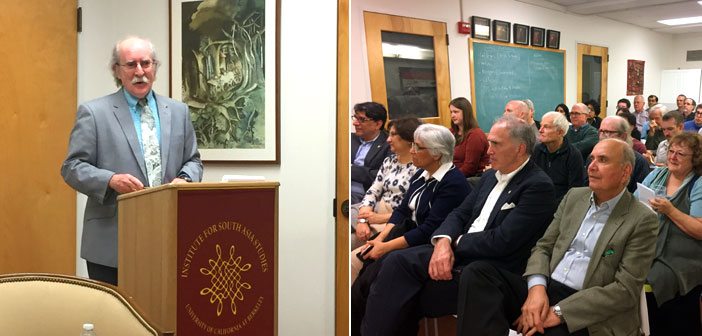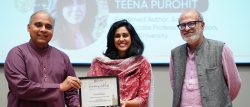Every year, the Institute of South Asia Studies hosts the Mahomedali Habib Distinguished Lecture on Pakistan. It is named in honor of one of the leading figures in the history of the Habib family who was distinguished by his love for Pakistan and his deep commitment to education and philanthropy. This lecture series aims to improve and diversify conversations about Pakistan in the United States as well as create opportunities for US and Pakistan-based scholars to dialogue.
Munis Faruqui, Chair of the Institute of South Asia Studies elaborated: “The way in which this Habib Distinguished Lecture series has served as a catalyst speaks really well of the Habib family, and also the Habib Foundation’s willingness to invest in UC Berkeley, in their ability to think around the corner, to think expansive, and also imaginative. […] Its creation marked the first step to the establishment of a Pakistan Studies Initiative here at UC Berkeley in 2013. Building off this foundation, a really dynamic Pakistan focused ecosystem has emerged at the Institute for South Asia Studies.”
The fifth lecture in this series was held on October 19th and welcomed the famed historian of South Asia, David Gilmartin, Professor of History at North Carolina State University. His research interests focus on the intersections between the history of British imperialism in South Asia and the development of modern politics and forms of rule. His most recent book, Blood and Water: The Indus River Basin in Modern History (2015) examines the intersection between environmental and political history over the last 200 years. His talk was titled ‘Pakistan’s Creation and the Contested Grand Narratives of the 20th Century History’.
He began by giving context to the title of the talk: “There is one point which lies at the heart of what I want to get at in this lecture, and it does have to do with one of the important grand narrative of the 20th century. And that is the history in the broadest sense, of the transformations that were associated with the decline and breakup of the great colonial empires and the emergence of this idea of a world of self-governing nations, that is associated with the concept of de-colonialization… But when you read general accounts of de-colonialization as a world-wide phenomenon, not very much attention is usually paid to Pakistan… It is often a footnote in the history.”
“What I would like to do is to shift the focus of the story and talk about the creation of Pakistan in relationship to another concept, which is associated with both these things: nationalism and religion, but which is not the same. And this is the concept of popular sovereignty or the sovereignty of the people.”
He spoke extensively about how nation-states gain sovereignty, which involves both pragmatic elements as well as aspects of social legitimacy, which often involved strong individuals around which people gathered. In the Mughal area this was based on genealogy, but later these were “people who shared in a human development associated with reason, or what scholars call the enchantment of reason. The idea that this too created a class of people who transcended the larger mass of the people. […] This idea was manifested most clearly in a sovereign concept which is called the rule of law, because law was the embodiment of this vision.” He then contextualised this in the concept of religion as custom, and the role of law in structuring its practice.
Gandhi’s movement as well as socialism were two of the movements that mobilised the idea that people are sovereign. The introduction of the elections provided for a fundamental transformation, as the process was fully in control of the British, and separate electorates for various religious communities created segregation and minoritization. “Jinnah was a great champion of the rule of law, but again, it is a rule of law in a very tenuous relationship to the actual organization of the community, or to the idea of the community.”
To conclude he argued that “maybe we could move to a better understanding of Pakistan’s creation if we dropped religion as a category in thinking about it. If we thought about sovereignty as a notion of concrete power but also as a frame for what I call enchantment. Maybe we could then get to a place where Pakistan would be a really critical case study in the history of the 20th century of the way the idea of people’s sovereignty played out in the late colonial circumstances.”

The talk was followed by a vibrant discussion amongst visitors from various academic institutions and also from Habib University including President Wasif Rizvi, Vice-President Dr. Talat Azhar, and CEO of Habib University Foundation Parvez Ghias. Wasif Rizvi closed the evening by taking note of the legacy that the lecture series has established and its importance also for Pakistan, since “in Pakistan universities for the longest time have been disenfranchised from engaging with these questions.” He thanked the Institute and the University for being such great partners, to resonate profoundly with Habib University’s mission.




